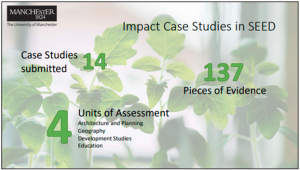
SEEDs of Change: How do you know your research is making a difference?
Researchers share their strategies for evidencing impact
At the latest SEEDs of Change seminar, we focused on how to evidence impact and show that your research is making a difference.
Carly opened the session with an overview of the evidence submitted by SEED in support of our REF2021 impact cases. Whilst impact work is about more than just the REF, the impact case studies are a useful resource to look at and learn from.

Testimonials made up most of our evidence base, followed by citations in reports, news articles and guidance documents, and participant feedback. We found that testimonials were a good way to evidence our impact because they allowed stakeholders who’d used our research to specifically explain the difference the research had made in their organisations. They’re a rich, qualitative source of evidence and worked well alongside quantitative indicators.
Practical Examples
Jo Barrow shared her experiences of working on a project to encourage people to self-isolate during the Covid-19 pandemic. The team provided training for Test and Trace staff in motivational interviewing techniques, which promote motivation and commitment to behavioural change. Training sessions and resources were evaluated by surveying and interviewing people who took part in the sessions, to gather their feedback and develop the training further. The team also collected data on the numbers of participants, how many requests there were for the resources, and who requested them.
Next, Jeremy Carter gave us an overview of his work on climate change adaptation. He and his team developed the European Climate Risk Typology, a web-based open access platform that helps regions to visualise their climate risk. Jeremy made the point that impact often happens post-project. So it’s important to maintain relationships with stakeholders to find out how they’re using your research.
Using Pure
Our final presenter, Lauren Tempelman, emphasised the importance of keeping your Pure profile up to date. Pure is a secure repository for storing impact evidence. Pure records can be kept confidential until you’re ready to share them. Displaying details of impact on your public profile means that people can see it – which could enhance your future impact.
We hope that the session was useful – look out for details of the next SEEDs of Change event in the new academic year.
Photo by Francesco Gallarotti on Unsplash




0 Comments